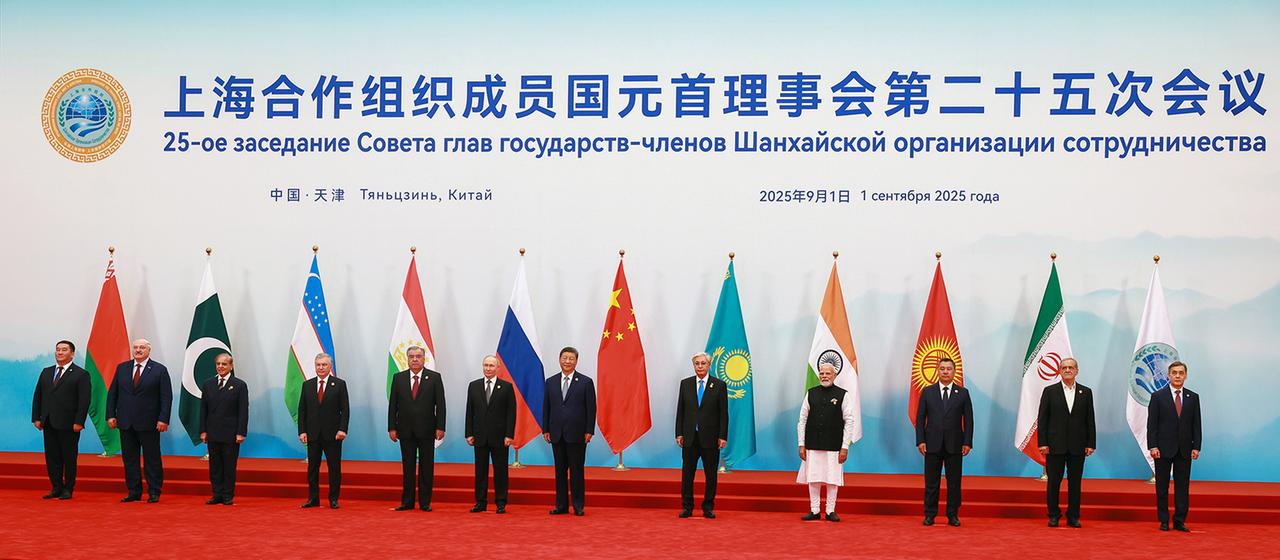
Red carpet, backslapping, family photo – at the meeting of the Shanghai Cooperation Organization, the member states demonstrated unity. A sign also against the West.
At the summit of the Shanghai Cooperation Organization (SCO), Chinese President and Party leader Xi Jinping criticized the current global situation as"chaotic." Changes and turbulence are intertwined, he said in his address to more than 20 government representatives. He called on the SCO member states to work more closely together.
He also wants to accelerate the establishment of a joint development bank. China's leadership has long been trying to establish alternative structures to US-led institutions.
The alliance of China, Russia, Belarus, India, Iran, Pakistan, and Central Asian states on security and economic issues is intended to serve as a counterweight to alliances of democratically governed states. The members of the Shanghai Cooperation Organization account for approximately 40 percent of the world's population.
What is the Shanghai Cooperation Organization?
The Shanghai Cooperation Organization (SCO) was founded in 2001 and is headquartered in the Chinese capital, Beijing. Its founding members are China, Russia, Kazakhstan, Kyrgyzstan, Tajikistan, and Uzbekistan. Since then, India and Pakistan have joined, followed by Iran and Belarus.
The goals of the world's largest regional organization primarily include security cooperation, maintaining regional stability, and economic issues. According to critics, unofficial goals also include curbing US influence, especially through NATO, and preventing revolutions.
SCO not a"defense alliance"
"The authoritarian dimension of the club is certainly present, although it is not a purely authoritarian club," says Eoin McNamara of the Finnish Institute of International Affairs about the SCO. Membership has grown significantly recently.
"There were predictions and speculations that the Shanghai Cooperation Organization could develop into an organization that could potentially compete with NATO or the European Union. And we would then have these alliances that clash directly," McNamara said. But he doesn't see that happening."This is not a defense alliance."
Red carpet for Russia's narrative
At the summit in Tianjin, China also gave Russian President Vladimir Putin a red carpet welcome. Putin used the platform to spread Russian narratives about the war against Ukraine. Putin called the crisis not caused by Russia's attack on Ukraine.
He again blamed the West and NATO for the war and spoke out against a world order dominated by Europe and the USA.
Meeting between Putin and Xi planned
A meeting between Putin and Xi is apparently planned for tomorrow in Beijing. On Wednesday, Putin will also participate in the large military parade marking the 80th anniversary of the victory in the War of Resistance against Japan. North Korean dictator Kim Jong Un is also expected to attend the parade in the Chinese capital.
Russia and China view themselves as strategic partners. Their relationship has deepened further following Russia's war of aggression in Ukraine, and trade has expanded. Although China's government officially presents itself as neutral in the Ukraine war, it is considered Russia's most important economic and political supporter.
India is moving closer to China
On the sidelines of the summit, Putin also met with Indian Prime Minister Modi. Both countries emphasized their cooperation and partnership. Regarding the war in Ukraine, India remains neutral. However, the world's most populous country has become the second-largest buyer of Russian oil and has therefore recently become the target of punitive measures from the United States.
This is also one reason why India is now moving closer to China again – despite the differences between the two countries. For example, there are talks on the border dispute in the Himalayas, and direct air connections between China and India are to be resumed.

